Alibaba Group from China has put a hold on plans to invest in Indian companies, the reason being souring business relations and rising political tension between the two nations after a clash on their Himalayan border.
Alibaba, which has contributed to the growth of several Indian start-ups, has refrained itself from pumping in fresh funds to expand its investments in the country for at least six months.
However, currently, they are not planning to reduce stakes or exit investments from any Indian companies.
Since the last 5 years, the Chinese conglomerate and its associates Alibaba Capital Partners and Ant Group have invested more than $2 billion in Indian companies and participated in funding rounds of at least another $1.8 billion, according to data from PitchBook, which tracks private market financing.
Some of Alibaba’s investee companies in India will take a blow as hitting the brakes could slow fundraising plans for them.
Some of the biggest investments by Alibaba in Indian start-ups
Zomato
In 2008, DeepinderGoyal and Pankaj Chaddahdeveloped online food ordering app, Zomato, funded by Indian online giant Info Edge. However, Alibaba’s financial services company Ant Financial became a stakeholder in Zomato in 2018 with an investment of $200 million. Later in the same year, Ant Financial invested another $210 million. Zomato has raised a total of $914.6 million.
BigBasket
Founded by AbhinayChoudhari, Hari Menon, Vipul Parekh, VS Sudhakar in 2011, BigBasket is one of India’s largest online food and grocery online store. To date, BigBasket has raised over $1 billion and most of which has come from foreign investors. Alibaba became BigBasket’s largest shareholder when it helped the company raise $300 million in its series E round in 2018. Alibaba Group was still the largest stakeholder in the company with a 26.26% stake, as of 2019.
Paytm
Founded by Vijay Shekhar Sharma in 2010, Paytm started as online recharge platform for prepaid mobile, DTH and data card with an initial investment of $2 million from the founder himself.
Paytm is the first Indian company to receive funding from Chinese e-commerce Company Alibaba which is now raised over $625 million. Vijay currently owns less than 20% of his own company. Chinese technology giant Alibaba owns over a 40% stake in Paytm. If we talk about overall Chinese ownership, both Alibaba and SAIF Partners together own about 60% of Paytm.
In April, India put investments from China and other bordering countries under greater scrutiny
The government made its prior approval mandatory for foreign investments from countries that share a land border with India to curb “opportunistic takeovers” of domestic firms following the Covid-19 pandemic, a move that will restrict FDI from China.
Countries that share land borders with India are China, Bangladesh, Pakistan, Bhutan, Nepal, Myanmar, and Afghanistan.
“An entity of a country, which shares a land border with India or where the beneficial owner of investment into India is situated in or is a citizen of any such country, can invest only under the government route,” according to a press note issued by the Department for promotion of Industry and Internal Trade (DPIIT).
It said that the government has amended the FDI (foreign direct investment) policy to curb “opportunistic takeovers/acquisitions” of Indian companies on account of the Covid-19 pandemic.
However, a border clash in June, in which 20 Indian soldiers were killed, escalated tensions, and India imposed stricter curbs on Chinese goods and businesses amid calls for boycotts.
“Alibaba and a few others have put on hold their India investment plans for six months and they are hoping that things would cool off a bit after that.
“No one is planning to put their stakes in Indian ventures on the block given the market condition and the fact that there aren’t many buyers.
Indian start-ups are heavily funded by Chinese investors such as Alibaba and Tencent. Bankers have previously said they were looking to bolster their presence in the country with an aim to grow their revenues outside China.
There is a lot of interest from European and US-based investors to fill the gap left by the Chinese.




